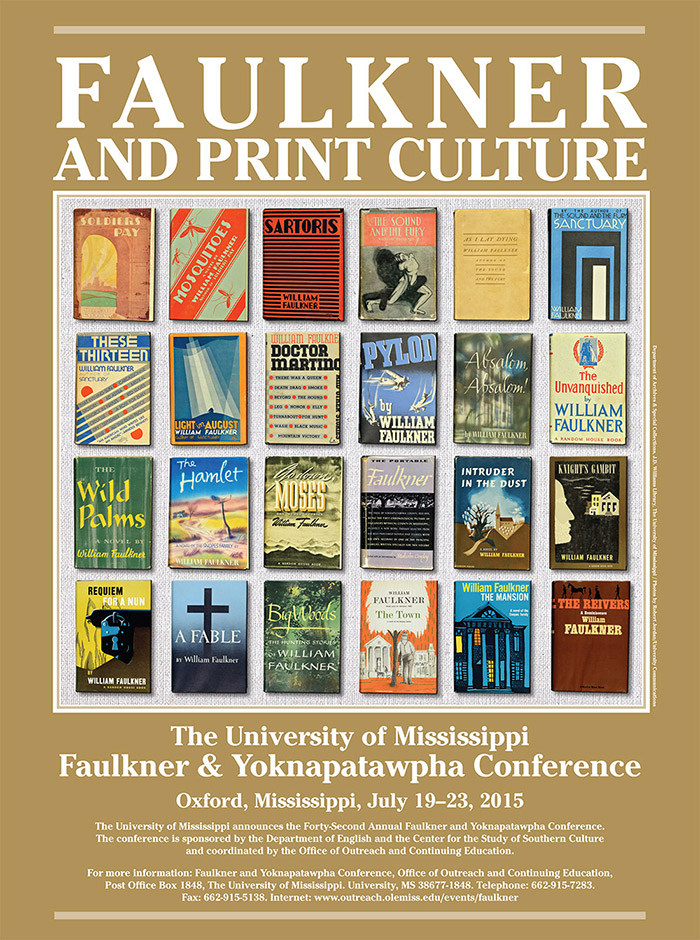
Panel. Print Culture and the Discourses of History, Law, and Medicine
Location
Nutt Auditorium
Start Date
20-7-2015 11:00 AM
Description
- Reconstructing Faulkner's World: The Fictional Status of the Chronology and Genealogy in Absalom, Absalom! / Christian Howard, University of Virginia
In the 1980s and ‘90s, Noel Polk edited the Vintage International reissued editions of Faulkner’s work to conform better to Faulkner’s authorial intentions. Yet while carefully analyzing his grammatical practices, Polk overlooked the importance of extra-textual material – such as the appendices to Absalom, Absalom! – that Faulkner created as part of his fictional universe, material that Faulkner himself called “the key” to his novels. This paper draws upon Faulkner’s archives at the University of Virginia in order to reexamine the appendices of Absalom, Absalom!, and it seeks to answer the question: What is the fictional status of Faulkner’s extra-textual material? - Anse Bundren and the Vampire of the South / Jay Ingrao, Randolph-Macon College
In widely-circulated handbills, as well as in articles and venues such as the 1910 Mississippi State Fair, hookworm crusaders railed against eugenicists in arguing that the poor white, with proper treatment, possessed the potential to overcome his lubber ways and contribute to society. Faulkner’s treatment of Anse Bundren challenges this re-contextualization of the poor white in the failure of crusaders to truly elevate the poor white as a class, and questions the face of medical professionalism as the new face of southern patriarchy in the early twentieth century. - Strange and Violent Revisions: Print Culture, Rape Culture, and Legal Culture in Faulkner's Sanctuary / Michael Lahey, University of Alberta
I will examine Sanctuary as a proto-feminist investigation of what is now known as rape culture and the subtle ways Faulkner exposed this Yoknapatawpha social ordering underneath his novel’s infamous, boisterous appearance into print culture. First looking at Sanctuary’s revision history, I go on to discuss how the novel itself is intensely concerned with the authority and mobilities of print culture, especially the strangely depicted secret legal pact (written? unwritten but understood by all parties?) underscoring the culminating trial scene, the novel’s most powerful rape culture moment, enacted long after Temple’s rape has occurred. I close with an examination of Sanctuary as a law-literature text, an example of this powerful literary sub-genre.
Relational Format
Conference proceeding
Recommended Citation
Howard, Christian; Ingrao, Jay; and Lahey, Michael, "Panel. Print Culture and the Discourses of History, Law, and Medicine" (2015). Faulkner and Yoknapatawpha Conference. 8.
https://egrove.olemiss.edu/fy/2015/schedule/8
COinS
Jul 20th, 11:00 AM
Panel. Print Culture and the Discourses of History, Law, and Medicine
Nutt Auditorium
- Reconstructing Faulkner's World: The Fictional Status of the Chronology and Genealogy in Absalom, Absalom! / Christian Howard, University of Virginia
In the 1980s and ‘90s, Noel Polk edited the Vintage International reissued editions of Faulkner’s work to conform better to Faulkner’s authorial intentions. Yet while carefully analyzing his grammatical practices, Polk overlooked the importance of extra-textual material – such as the appendices to Absalom, Absalom! – that Faulkner created as part of his fictional universe, material that Faulkner himself called “the key” to his novels. This paper draws upon Faulkner’s archives at the University of Virginia in order to reexamine the appendices of Absalom, Absalom!, and it seeks to answer the question: What is the fictional status of Faulkner’s extra-textual material? - Anse Bundren and the Vampire of the South / Jay Ingrao, Randolph-Macon College
In widely-circulated handbills, as well as in articles and venues such as the 1910 Mississippi State Fair, hookworm crusaders railed against eugenicists in arguing that the poor white, with proper treatment, possessed the potential to overcome his lubber ways and contribute to society. Faulkner’s treatment of Anse Bundren challenges this re-contextualization of the poor white in the failure of crusaders to truly elevate the poor white as a class, and questions the face of medical professionalism as the new face of southern patriarchy in the early twentieth century. - Strange and Violent Revisions: Print Culture, Rape Culture, and Legal Culture in Faulkner's Sanctuary / Michael Lahey, University of Alberta
I will examine Sanctuary as a proto-feminist investigation of what is now known as rape culture and the subtle ways Faulkner exposed this Yoknapatawpha social ordering underneath his novel’s infamous, boisterous appearance into print culture. First looking at Sanctuary’s revision history, I go on to discuss how the novel itself is intensely concerned with the authority and mobilities of print culture, especially the strangely depicted secret legal pact (written? unwritten but understood by all parties?) underscoring the culminating trial scene, the novel’s most powerful rape culture moment, enacted long after Temple’s rape has occurred. I close with an examination of Sanctuary as a law-literature text, an example of this powerful literary sub-genre.

